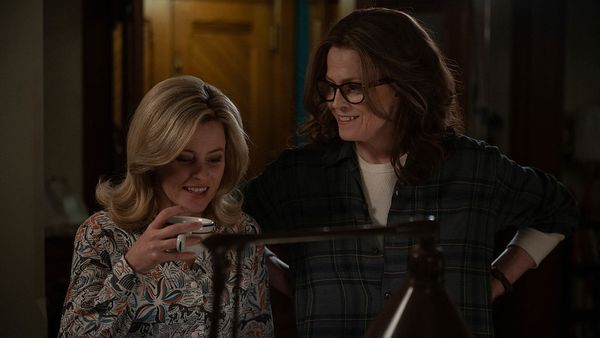Eye For Film >> Movies >> Call Jane (2022) Film Review
Call Jane
Reviewed by: Jeremy Mathews

It’s 1968 and a housewife in suburban Chicago needs an abortion. It’s not that she doesn’t want a second child; she has a heart condition caused by the pregnancy and her doctor explained the cure as, “don’t be pregnant.” The executive panel at the hospital — all men, of course — determine that an emergency exception wasn’t warranted because there was a good chance the baby could survive, even if the mother didn’t.
This is the atmosphere in which the underground Jane Collective emerged to provide safe abortions, and the conditions in which Joy, the heroine of Phyllis Nagy’s Call Jane, finds them. After all other options have failed and a back-alley procedure proves too scary to go through with, a vaguely worded flier saying “Call Jane” appears as the only remaining hope.

Elizabeth Banks stars as Joy, whose worldview is shaken after her experience, and who finds herself trying to do as much as she can to help the organisation provide care to more and more women who need it.
Joy first finds herself called upon to help drive a blindfolded patient to her appointment, the same way she received her care, and that sets her on a path of illegal underground activism. Joy’s first patient serves as a direct counterpoint to her own situation. She picks up a perky young lady who had an affair with her boss, who wants her to get rid of the baby. She talks about how it’d be nice if the abortion doctor is cute.
Sigourney Weaver steals the show as Virginia, the head of the Janes. Weaver combines a somber passion with a warm, welcoming demeanor, explaining to Joy that it isn’t their part to judge who they will and won’t help. Weaver’s standout scene, however, might be a drinking game negotiation with their underground doctor (Cory Michael Smith).
Nagy is well known as a playwright and made a name for herself in cinema with the screenplay for Todd Haynes’s Carol, another period piece about women encountering social taboos. Here, she pulls great performances out of her actors and proves able to invoke a period with quiet costume and production design.
The film’s greatest weakness (other than a not-technically-anachronistic-but-extremely-unlikely appearance of The Velvet Underground’s White Light/White Heat album) may be its attempts to shore up familial drama with Joy’s husband, played by Chris Messina. While Messina ably slides into the role, as does Grace Edwards as their daughter, there isn’t quite enough breathing room around their character arcs to fully sell them.
That said, Call Jane is generally very well grounded in its characters. The opening scene takes place at a hotel reception in which the Democratic National Convention riots are briefly glimpsed behind guarded hotel doors, and the characters reference the result of Nixon-Humphrey election a few months later, which helps define the timeframe of the story.
Apart from those moments, screenwriters Hayley Schore and Roshan Sethi rarely depart from what these people are experiencing in their lives. A lot of turns could have been taken in the name of messaging, intrigue or creating a prestige picture. We don’t see a sinister mob boss, an intrepid police detective or any of the other lazy archetypes that would have been very easy to write into this story to give it some edge and remind us of the potential threat. Hell, we don’t even see the police raid that took the Janes down shortly before Roe v. Wade.
Nagy and her screenwriters’ disciplined refusal to pursue these grandiose storylines results in a well-earned sense of community. The takeaway doesn’t revolve around the collective’s enemies, but of its members, and their willingness to give a big chunk of their lives to safely provide a service that that their community needed. It’s about too hot-button an issue to claim that the message is universal, but it’s certainly inspiring.
Reviewed on: 26 Jan 2022















